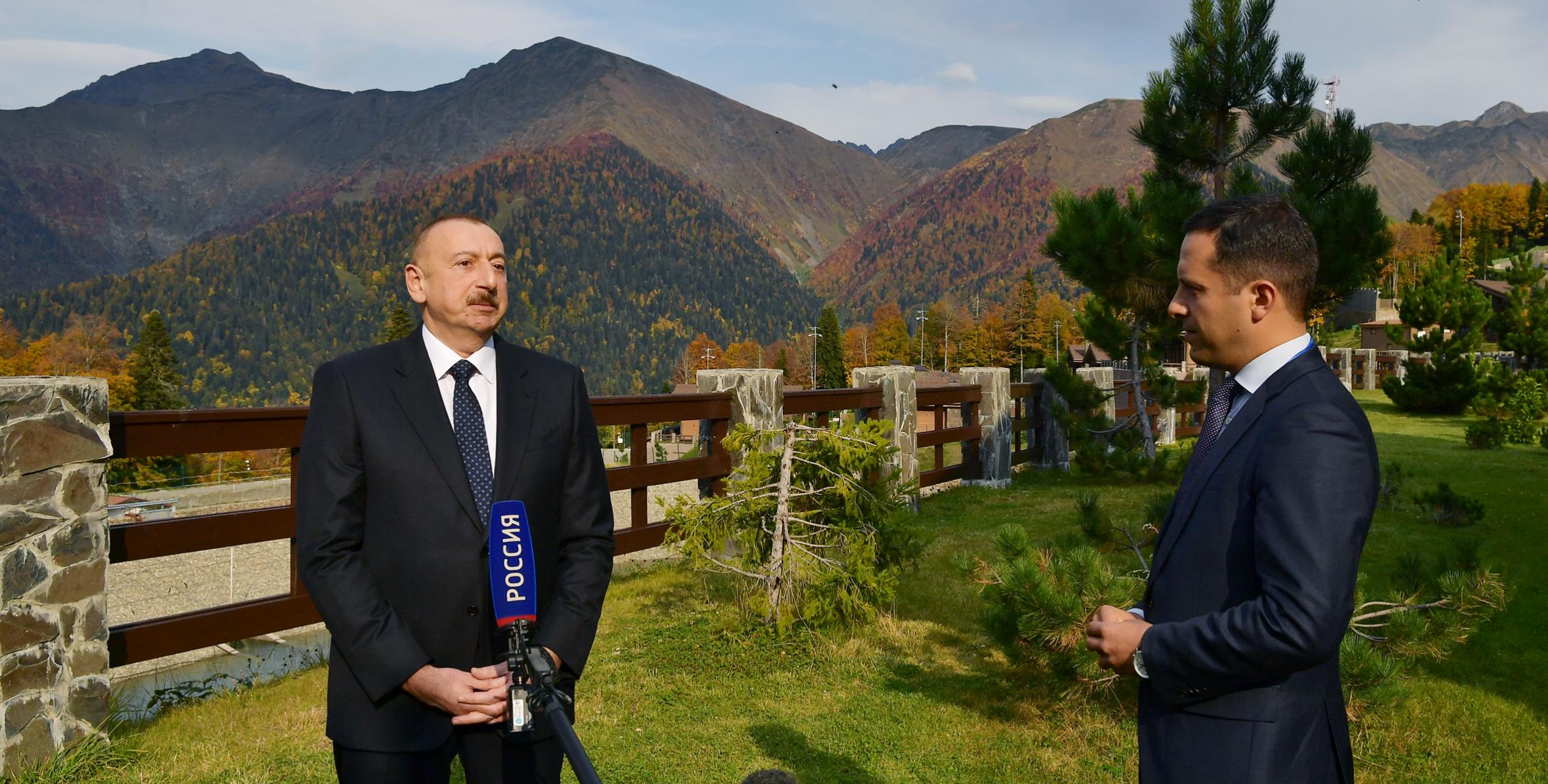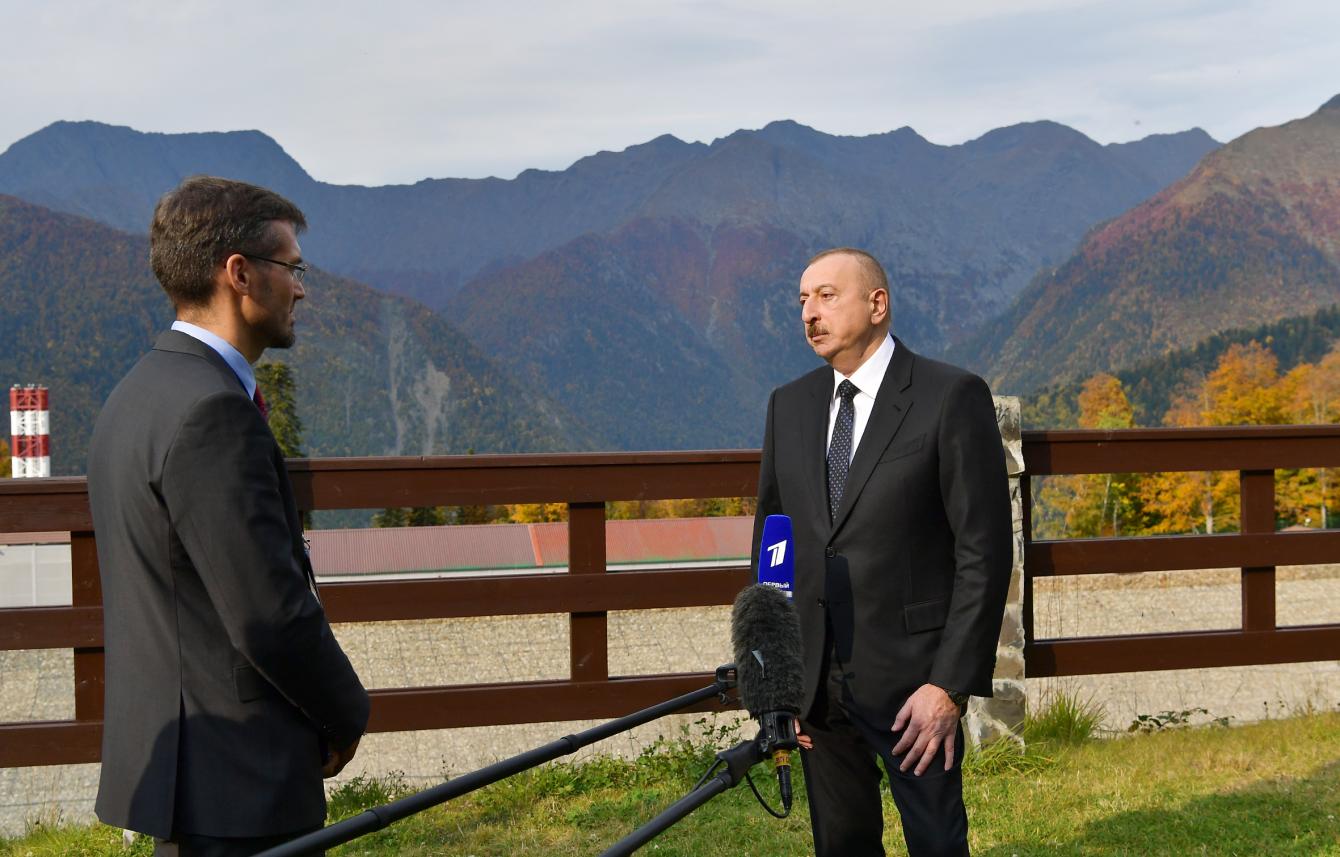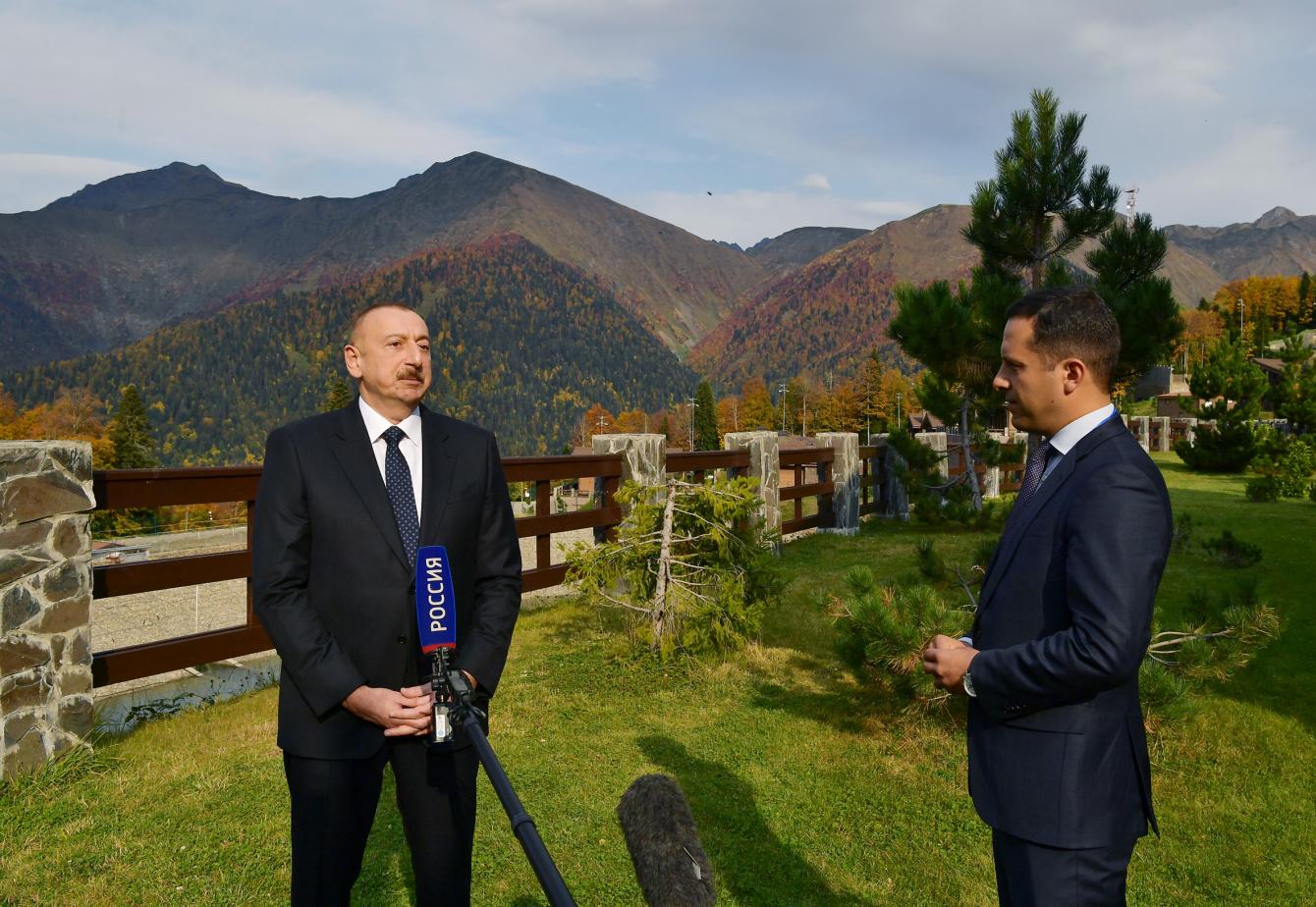President of the Republic of Azerbaijan Ilham Aliyev has responded to questions from correspondents of Channel One and Rossiya television channels in Sochi.
During a visit to Sochi on 3 October, President of the Republic of Azerbaijan Ilham Aliyev gave an interview to Rossiya and Channel One TV channels ahead of the meeting of the Valdai International Discussion Club.
X X X
- Hello, Mr. President. Alexey Golovko, the Vesti program.
- Very nice to meet you.
- The theme of this year’s Valdai forum is “The Dawn of the East”. Special attention is being paid to Asian countries. It is possible to say that Azerbaijan, like Russia, is located at the junction of Europe and Asia. What are the main questions you would like to raise here? And what questions would you like to receive answers to?
- First of all, I would like to express my gratitude to President of Russia Vladimir Vladimirovich Putin for the invitation to take part in the Valdai Discussion Club. The Valdai Club has established itself as one of the most important events on the world agenda and a platform for the discussion of very topical issues. Of course, I had a meeting with Vladimir Vladimirovich today. We discussed the agenda of our bilateral relations, which is very diverse and covers many areas. Therefore, of course, I plan to highlight the bilateral agenda, the urgent problems Azerbaijan has encountered and the new challenges. Therefore, I look forward to a very interesting discussion today.
- As is known, Azerbaijan has good relations with Western countries. Russia has been under sanctions for several years now. Doesn’t this prevent you from cooperating with Russia and developing all these bilateral projects?
- No, it doesn't prevent us at all. Our relations with Russia are free from any other foreign political agenda. They are time-tested. Both parties describe these relations as relations of strategic partners. And this is actually the case. We are both neighbors and good friends. Our relations have become much better and more effective of late. We cooperate on international platforms and support each other. I must say that during the June session of PACE, when the issue of the Russian delegation’s return was being decided, the entire Azerbaijani delegation in Strasbourg voted for Russia to return to the Parliamentary Assembly of the Council of Europe. We also have close cooperation at the UN, the OSCE, the CIS, of course, and very close trade and economic relations. The growth in trade this year is more than 20 percent. There are multibillion investments from Russia in Azerbaijan and from Azerbaijan to Russia. There is cooperation in energy, transport, humanitarian sphere, military-technical cooperation, and tourism. In other words, it is easier to name the areas we do not cooperate in. Therefore, I want to say again that Azerbaijan, a country pursuing an independent foreign policy, considers Russia as one of its most important partners, a good friend and neighbor. Today's meeting with President Putin confirmed this once again.
- My next question is not about politics, but about your alma mater – MGIMO. There will be an anniversary soon. You are the first MGIMO graduate to become President. What are the main qualities this university has given you and how does it help you in your political activity now?
- You know, student years are quite special for everyone. These are the years of maturity and entry into independent life. For me, this was also accompanied by the fact that I changed my place of residence and moved from Baku to Moscow. I have to say that my parents sent me to school early – I wasn’t even 6 years old. Therefore, I completed my secondary education when I was under 16. Frankly speaking, I didn’t even have a passport. So I came to Moscow with a reference letter. And by the time of the first winter exam session I turned 16 years old and received a passport. Of course, this is teenage time but I felt quite comfortable at the institute. The environment was very positive, and there was a very good relationship with people in my group and with teachers. Those years are unforgettable – they gave me both the knowledge and communication experience. This was the first experience of independent life. I have to say that although I received a job placement at the USSR Embassy in one of the countries after graduation, I preferred to stay at MGIMO, entered the graduate school, defended my thesis and worked there for many more years. So I was associated with the institute for 15 years. Of course, all this contributed to the fact that the first MGIMO Alumni Forum was held in Baku on my initiative. I even remember joking that it couldn’t have been otherwise – it had to be held in Baku not only because I was the only President at that time, but also due to the alphabetical order of countries and surnames. And I am glad that this forum has now become traditional. I think it has already been held five times.
Of course, this brings us all together. I have very warm recollections of both teachers and friends at the institute and wish MGIMO continued success on this anniversary. I am glad that the university has for many years been headed by my good friend Anatoly Vasilyevich Torkunov, whose contribution to the development of MGIMO and its becoming one of the leading universities in the world is very large.
- Last quick question. President Tokayev is also a graduate of MGIMO. Does this help you build Azerbaijani-Kazakh relations?
- You know, I'm glad that I'm not the only President. Of course, Kassym-Jomart Kemelyevich and I have known each other for a very long time. We met in Kazakhstan, in Azerbaijan and as part of international events. Of course, when he was elected to this post, I called him to congratulate, we exchanged opinions on how we will continue to build up the good relations that have developed over many years and the foundations of which were laid by President of Azerbaijan Heydar Aliyev and President of Kazakhstan Nursultan Nazarbayev. In other words, we will continue these traditions, and I am sure that Kazakhstan and Azerbaijan will also actively interact in the future.
- Thank you very much!
- Thank you!
Х Х Х
- Hello. Channel One. Incidentally, I am a MGIMO graduate. So in a sense we are ...
- In what year?
- In 1998. The Faculty of International Journalism.
Our first question is about the events that are taking place here today, that is Valdai. The theme is "The Dawn of the East". In other words, it is about the emergence of the East, the strengthening of the eastern direction. What role do Azerbaijan, Russia and Russian-Azerbaijani relations play in this process?
- Azerbaijan is geographically located between the East and West. This is why we participate both in international organizations that unite countries of the East and, for example, in an organization such as the Council of Europe. Geography, of course, has influenced and is still influencing geopolitics. Azerbaijan today uses its geographical location, and I believe that it has managed to achieve the fact we play a role in establishing dialogue between countries of East and West in the humanitarian sphere, in the transport sector and in all other areas, today.
Russia is the biggest country in the world and therefore, of course, the role of Russia not only in the affairs of the Asian continent but also on a global scale is quite large. It is growing, and Russia’s potential and power are increasing.
As for our bilateral relations, they are very positive, have very good dynamics, cover almost all spheres of life and are very trusting. My meetings with President Vladimir Vladimirovich Putin – there were four last year and two this year – have given a very serious impetus to the development of bilateral cooperation. They also positively affect the situation in our region.
- World order and view from the East. What principles should the world order be based on when viewed from the East?
- I think that irrespective of the angle, the main principle should be compliance with the norms and principles of international law. Unfortunately, they are flagrantly violated and there is a selective approach to respect for these principles. As a country that has suffered from non-compliance with the principles of international law, including those related to the occupation of our territory by Armenia of course, Azerbaijan defends the priority nature of international law at all international platforms. The UN Security Council sometimes implements resolutions within days, but in our case they have remained on paper for more than 25 years. Thus, this leading world institute is somewhat discredited. Therefore, I think that the priority nature of international law should be the main factor in the world order. But the reality is that this is not the case. Little depends on a country such as Azerbaijan in global world affairs. Therefore, I think that leading countries of the world have the main responsibility to ensure that the principles of world order are respected.
- I would now like to ask a couple of questions about MGIMO. What memories do you have from the institute?
- I have the warmest memories. Fifteen years of my life are connected with the institute. Studying, graduate school, work, a lot of friends and acquaintances – of course, these years were very important for me both in terms of maturity and in terms of gaining knowledge. I am in regular contact with the leadership of the institute. I initiated the first MGIMO Alumni Forum, which was held in Baku several years ago and has now become a permanent platform. I participated in the celebrations dedicated to the 60th anniversary of MGIMO. Also, on the eve of the 75th anniversary, I congratulate all my friends, fellow students and teachers on this remarkable anniversary.
- And what role do you think MGIMO has played in your life? If there had been another university, would everything have turned out differently?
- I don’t know, it’s hard to say what would have happened. But of course, MGIMO has played a very important role. Because the knowledge I got there helped me a lot in my future work very much. After I left the institute, I did not work in my profession, so to speak. But already as President the knowledge and skills that I received at MGIMO have been very useful, including the knowledge of foreign languages.
-Thank you very much!



